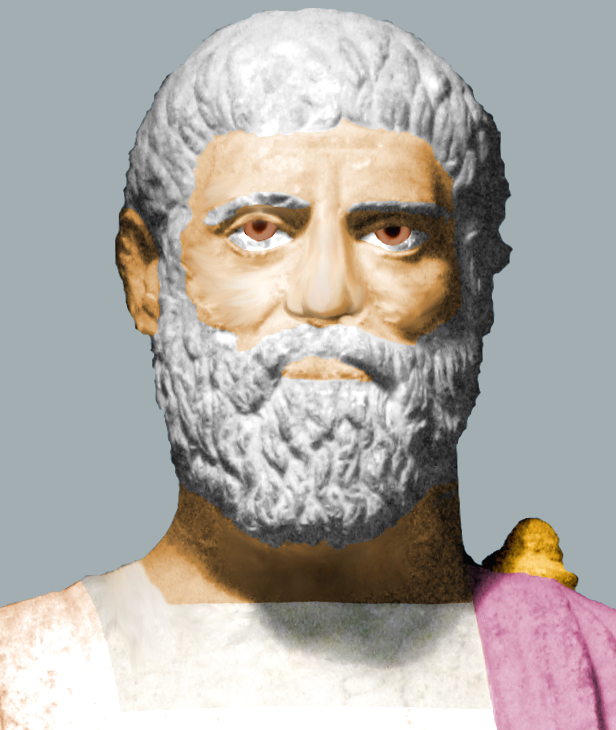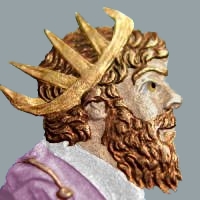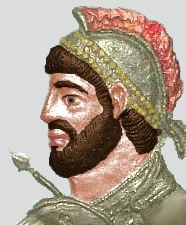ROMAE et AVGVSTO:
to ROME and AUGUSTUS
Rome · Julius · Augustus · Germanicus · Claudius · Britannicus · Vespasian · Titus · Nerva · Divine House · Trajan · Hadrian · Antinoüs · Antoninus · Verus · Marcus · Pertinax · Postumus · Probus · Julian

Digital retouching of a possible depiction of the divine Pertinax.
(Modification of a photograph by Codrin.B, licensed CC BY-SA)
The Divine Pertinax
Principate: January–March 193
Vanquisher of a revolt in Great Britain, Pertinax undertook to reform the evils the State had been subject to under his predecessor, the megalomaniacal Commodus. A Ligurian by origin, Pertinax could not boast an aristocratic lineage. Nevertheless, he triumphed thanks to the wisdom, force of character, and freedom of thought that his principate foretold. Rather remarkably, Pertinax enjoyed the favour of both the Senate and the common people, and indeed of practically everyone who had not directly benefited from the tyranny of Commodus—such as the Pretorian Guard. It was these last who assassinated him, less than three months after his succession. The people remained loyal to his memory while the Senate was forced to endorse the adventurer who bought the loyalty of the Pretorians after his death.
According to the anonymous Epitome of the Cæsars, the people lamented his passing, crying out:
Pertinace imperante securi uiximus, neminem timuimus, patri pio, patri senatus, patri omnium bonorum
“While Pertinax reigned we lived secure and feared no one—that pious father, father of the Senate, father of all good people!”Epitome de Caesaribus 18; my translation.
Septimius Severus deserves credit for avenging Pertinax’ death, even though this was only the act of a new prince seeking popularity. The reign of Pertinax thus appears as a too brief breathing-space between the excesses of Comodus and the despotism of the Severans.Zosimus and Ammianus Marcellinus can tell us a little about the time of Pertinax, and other mentions are to be found in the three histories derived from the Kaisergeschichte, but our sources are largely unsatisfactory.
Birthday: 1 August
The Divine Postumus
Principate: 260–269
This excellent prince would have warranted our devotion even if he were not, so to say, one of our own. Faced with the implosion of the central power and the constant threat of barbarian invasions, the divine Postumus was able to rebuild an empire in Gaul, for Gaul. It had its own capital (initially Cologne), its imperial mint (in Trier), its own Senate and its own army. Postumus adopted the titles and honours of emperorship, but forebore from sowing civil war by advancing on Italy. His forces defeated their Germanic enemies and reestablished the peace and well-being of Gaul (no less than those of Great Britain and Hispania, where Postumus’ authority was also acknowledged). Postumus departed this life defending the city of Mainz (the fief of a defeated usurper) from being sacked by his own troops. The good of his country was the constant preoccupation of this emperor, forgotten by history for not forcing the Senate at Rome to recognize him.The full-length monograph by J. F. Drinkwater (1987), The Gallic Empire, brings together the disparate sources for the Gallic Empire, including numismatics.
Postumus is said to have been born at Deusone, which is perhaps to be identified with Diessen in today’s North Brabant (in the Netherlands), and thus in the country of the Nervii.Regionaal Archief Tillburg, “Romeinen in Deusone”. He was probably a protégé of Hercules, whom he honoured on several coin series. The Labours of Hercules series is highly rated by numismatists; other series make mention of “Hercules Magusanus” and “Hercules Deusoniensis” under Gaulish epithets.J. F. Drinkwater (1987), The Gallic Empire, pp. 162–163.
Birthday: unknown
Feast day: might be celebrated on 10 December, the date when tribunates began; we know that Postumus celebrated the fifth year of his tribunician power in 265–266 with great éclat.J. F. Drinkwater (1987), The Gallic Empire, pp. 93–95.
The Divine Probus
Principate: 276–282
Within the succession of ill-starred princes and usurpers of the Crisis of the Third Century, the divine Probus holds an honourable place. To be sure, he was not the only one to deserve to be remembered by posterity (the three Gordians, Decius and Tacitus were all men of virtue); but he is of particular interest to us for his services to Gaul. Like the divine Tacitus, Probus continued the work of reunification begun by Aurelian, but without the excessive severity that is to be reproached in the latter. Having secured his accession, Probus moved against the Franks and Alamanni who had overrun Gaul following the death of Postumus, as well as the Burgundians and Vandals who were active along the Danube frontier. Probus defeated each of these groups of barbarians (to whom he was magnanimous in victory), and took steps to reinforce the frontier. He defeated the usurpers Proculus and Bonosus, who were threatening the peace in Gaul, and also settled barbarians within areas of Gaul suffering from labour shortages. He was assassinated by his own troops when word reached them of Carus’ assumption of the purple.Zosimus’ account has useful information for the period of the divine Probus.
Birthday: 19 August (approximately)
The Divine Julian
Principate: 360–363 (Cæsar in the West: 355–360)
Despite the relative shortness of his reign, the divine Julian must rank among the most remarkable emperors of Roman history. As a military conqueror, as a civil reformer, as a philosopher, he would have merited the highest of praise even if he had not been so bold as to oppose the pretension of the Christian church, which then dominated the imperial household and the State. In an age when luxury and court ceremonial had reached the highest extremes of ‘oriental’ sensuality, Julian was modest; he ate and drank little; he preferred the simplicity of the barracks to the sumptuousness of the palace. (One of his favourite towns was the rustic, but well-sited Lutetia, which would one day grow into the great metropolis of Paris.) His plans to reorganize polytheistic religion (which he referred to as ἑλληνισμός or ‘Hellenism’) could not bear fruit thanks to his too early demise. He considered himself the reincarnation of the divine Alexander the Great. In the midst of a victorious campaign in Persia, he died a martyr’s death, struck down probably by the spear of one of his own soldiers (a Christian, if the rumour is to be believed).Ammianus Marcellinus devotes a good part of (what remains of his) History to Julian’s career; Zosimus’ account is also detailed. Furthermore, several works by the divine prince himself survive (the Misopogon, Orations on the Mother of the Gods and the Sun God, Discourses concerning the Cynics, letters, etc.) as well as others by contemporaries such as the philosopher Libanius and the Christian partisans Gregory Nazianzen and Cyril of Alexandria (the latter preserves important fragments the emperor’s polemic Contra Galileos).
Feast day: 6 November (the beginning of his reign as Cæsar; he was born either in November/December or in May/June)
Summary List
The Senate authorized the postumous cult of a number of members of the imperial house, whose names thenceforth were prefixed with the title díuus or díua (‘the divine’, respectively masculine and feminine), starting with the divine Julius (Julius Cæsar). Those honoured on Latin inscriptions are listed below:
- Augustus (Cæsar Augustus)
- Augusta (Livia)
- Drusilla (daughter of Germanicus, sister of the emperor Gaius)
- Claudius
- Poppea Augusta (wife of Nero)
- Claudia (infant daughter of Nero)
- Domitilla (daughter of Vespasian)
- Vespasian
- Titus
- Julia (daughter of Titus)
- Nerva
- Trajan the Father (biological father of the emperor Trajan)
- Plotina (Pompeia Plotina, wife of Trajan)
- Marciana Augusta (sister of Trajan)
- Trajan
- Matidia (Salonina Matidia, niece of Trajan and mother-in-law of Hadrian)
- Sabina (wife of Hadrian)
- Hadrian
- Faustina (wife of Antoninus Pius)
- Antoninus (Antoninus Pius)
- Faustina the Younger (wife of Marcus Aurelius, daughter of Antoninus Pius and Faustina)
- Verus (Lucius Verus)
- Marcus Antoninus, Marcus or Marcus Aurelius (Marcus Aurelius)
- Commodus
- Pertinax
- Julia Domna (wife of Septimius Severus)
- Severus (Septimius Severus)
- Paulina (wife of Maximinus Thrax)
- Gordian
- Decius
- Valerian
- Gallienus
- Aurelian
- Probus
- Carus
- Maximian
- Galerius Maximian
- Flavius Valerius Constantius
- Constantine Maximus Victor (Constantine the Great)
- Constantius
- Julian
- Jovian
- Valentinian
Antinoüs, the lover of Hadrian, was certainly worshipped as a god though he was not divinized by the Senate. Antinoüs was notably identified with Osiris, though he is peculiarly susceptible to syncretism of many kinds.
Notes
In addition to the sources cited below, I have made use of several secondary sources, particularly Richard D. Weigel’s site De Imperatoribus Romanis and the English and French editions of Wikipedia.

En français svp !

Auf deutsch, bitte!



